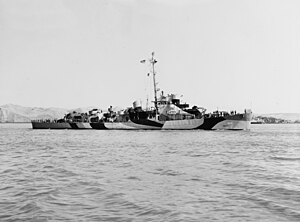USS Halloran (DE-305) was a Evarts-class destroyer escort of the United States Navy.

| |
| History | |
|---|---|
| Name | USS Halloran |
| Builder | Mare Island Navy Yard |
| Laid down | 21 June 1943 |
| Launched | 14 January 1944 |
| Commissioned | 27 May 1944 |
| Decommissioned | 2 November 1945 |
| Stricken | 28 November 1945 |
| Honors and awards | 3 battle stars (World War II) |
| Fate | Sold for scrapping, 7 March 1947 |
| General characteristics | |
| Type | Evarts-class destroyer escort |
| Displacement | 1,140 long tons (1,158 t) |
| Length | 289 ft 5 in (88.21 m) |
| Beam | 35 ft 1 in (10.69 m) |
| Draft | 8 ft 3 in (2.51 m) |
| Propulsion |
|
| Speed | 21 knots (39 km/h; 24 mph) |
| Complement | 156 |
| Armament |
|
Namesake
editWilliam Ignatius Halloran was born on 23 July 1915 at Cleveland, Ohio. He enlisted in the United States Naval Reserve as an apprentice seaman on 14 August 1940. Commissioned Ensign on 12 June 1941, he was assigned to Naval Air Station, San Pedro, California, and later to the USS Arizona. He went missing during the Japanese Attack on Pearl Harbor on 7 December 1941.
Construction and commissioning
editHalloran was laid down by Mare Island Navy Yard, Vallejo, California, on 21 June 1943; launched on 14 January 1944; sponsored by Mrs. L. J. Halloran, mother; and commissioned on 27 May 1944.
World War II Pacific Theater
editAfter shakedown, Halloran departed California as a convoy escort on 31 July arriving Pearl Harbor on 9 August. Sailing for Eniwetok on 16 August, she arrived on 24 August and two days later she became part of the escort screen for fast oiler replenishment group steaming to the Western Pacific. Based at Manus, and later Ulithi, Halloran continued this duty until on 29 November, helping to bring vital fuel to fleet units off Palau, Yap, and Luzon. While moored at Ulithi on 20 November, she witnessed the torpedoing of oiler Mississinewa (AO-59) and in company with Rail (AM-26) searched the harbor fruitlessly for a suspected midget submarine.
Screening tankers to Marshall Islands
editFrom 5 to 7 December, Halloran screened two escort carriers transporting replacement aircraft to Manus, and on 14 December she sailed to escort tankers to Eniwetok. She departed on 19 December for Pearl Harbor, arriving Christmas Eve.
Iwo Jima
editHalloran was underway again on 22 January 1945, this time as a unit of the escort screen for the amphibious task force designated to capture Iwo Jima. After patrolling the area around the training site at Saipan, she served as a barrier patrol ship during the actual landings on 19 February. She continued this duty until 28 February when, she departed with a convoy. Steaming via Saipan and Tulagi, she reached Espiritu Santo on 15 March.
Okinawa
editThe far-steaming destroyer escort's next assignment was with the Okinawa assault forces. Departing Espiritu Santo on 25 March, she arrived off Okinawa on 9 April and began vital anti-submarine barrier patrols.
Okinawa kamikaze strike
editShe repelled six attacking Japanese aircraft on 12 April, splashing one and damaging two others, and was narrowly missed by a torpedo on 20 April. After performing various other duties, including assistance to the stricken Isherwood (DD-520) and escort duty to Saipan and 'back, she resumed her barrier patrols on 30 May. A kamikaze aircraft attacked Halloran on 21 June, but her gunners shot it down in the nick of time a scant 75 yards from the ship. However, an exploding bomb killed three men and caused considerable damage to hull and superstructure.
Philippines
editAfter repairs at Kerama Retto, Halloran patrolled off Ie Shima from 5 to 13 July, then assumed tactical command of an escort screen for LST's en route to the Philippines. After arriving Leyte Gulf on 17 July, she patrolled at San Pedro Bay, Leyte, and Lopez Bay, Luzon, prior to departing the Philippines for the United States on 10 September.
Stateside decommissioning
editHalloran arrived San Diego, California, on 29 September and sailed three days later for Charleston, South Carolina, where she arrived on 11 October. She decommissioned at Charleston on 2 November 1945. Her name was struck from the Navy List on 28 November 1945, and she was sold on 7 March 1947.
Awards
editHalloran received three battle stars for World War II service.
References
edit- This article incorporates text from the public domain Dictionary of American Naval Fighting Ships. The entry can be found here.
External links
edit- Photo gallery of USS Halloran (DE-305) at NavSource Naval History
- Ships of the U.S. Navy, 1940-1945 DE-305 USS Halloran
- DE Action And Damage Timeline of World War II
- uboat.net - Evarts class Destroyer Escorts
- USS Halloran (DE 305)